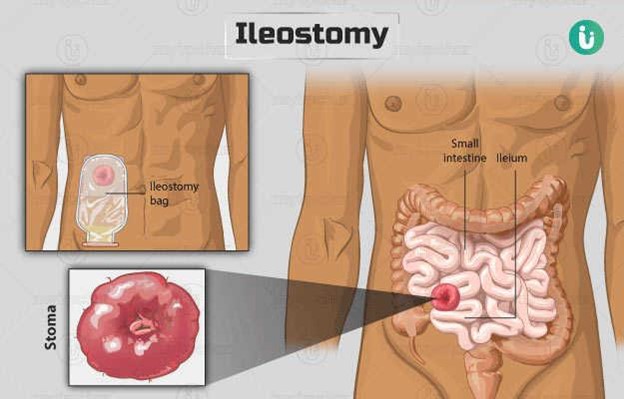A client has just had surgery to create an ileostomy. The nurse assesses the client in the immediate postoperative period for which most frequent complication of this type of surgery?
Intestinal obstruction
Folate deficiency
Malabsorption of fat
Fluid and electrolyte imbalance
The Correct Answer is D
Choice A Reason: This is incorrect because intestinal obstruction is not a common complication of ileostomy surgery. An ileostomy is a surgical opening in the abdomen that connects the end of the small intestine (ileum) to a pouch or bag outside the body. This allows stool to bypass the colon and rectum. Intestinal obstruction can occur if there is a blockage or narrowing in any part of the digestive tract, but it is more likely to affect the colon than the ileum.
Choice B Reason: This is incorrect because folate deficiency is not a common complication of ileostomy surgery. Folate is a vitamin that is essential for DNA synthesis and cell division. Folate is mainly absorbed in the jejunum, which is the middle part of the small intestine. An ileostomy does not affect the jejunum, so it does not interfere with folate absorption.
Choice C Reason: This is incorrect because malabsorption of fat is not a common complication of ileostomy surgery. Fat is digested and absorbed in both the small and large intestine. An ileostomy does not affect fat digestion, but it may reduce fat absorption by decreasing the transit time and surface area of the intestine. However, this is usually not significant enough to cause malabsorption symptoms.
Choice D Reason: This is correct because fluid and electrolyte imbalance is a common complication of ileostomy surgery. Fluid and electrolytes are mainly absorbed in the colon, which is bypassed by an ileostomy. This can result in increased fluid and electrolyte loss through stool, especially sodium and potassium. This can lead to dehydration, hypotension, weakness, cramps, or arrhythmias.

Nursing Test Bank
Naxlex Comprehensive Predictor Exams
Related Questions
Correct Answer is D
Explanation
Choice A reason: This is incorrect because increasing her voice when speaking to the client may not prevent complications, but rather annoy or offend the client. The nurse should not assume that a client with a visual impairment has a hearing impairment as well unless it is confirmed by assessment or history. The nurse should speak in a normal tone and volume and identify herself by name and role.
Choice B reason: This is incorrect because lowering the bed rails before lowering the bed may increase the risk of complications, such as falls or injuries. The nurse should keep the bed rails up until the client is ready to get out of bed and lower them only when necessary. The nurse should also lock the wheels of the bed and adjust it to a comfortable height for the client.
Choice C reason: This is incorrect because using hand gestures to point to where the client will walk may not prevent complications, but rather confuse or frustrate the client. The nurse should not use visual cues or gestures that are meaningless to a client with a visual impairment. The nurse should use verbal directions and descriptions instead, such as "The restroom is on your left, about 10 steps away."
Choice D reason: This is correct because standing slightly in front and to one side of the client can prevent complications, such as collisions or falls. The nurse should guide the client by offering her arm or shoulder for support and walking slightly ahead of him or her. The nurse should also warn the client about any obstacles or changes in terrain, such as stairs, doors, or rugs.
Correct Answer is B
Explanation
Choice A reason: This is incorrect because a drop in heart rate from 74 to 68/min is not a manifestation that requires immediate reporting to the provider. A mild decrease in heart rate can be normal or due to other factors such as medication, sleep, or relaxation. It does not indicate a worsening of brain injury or increased intracranial pressure.
Choice B reason: This is the correct answer because a change in the Glasgow Coma Scale score from 14 to 10 is a manifestation that requires immediate reporting to the provider. The Glasgow Coma Scale is a tool that measures the level of consciousness based on eye-opening, verbal response, and motor responses. A score of 14 indicates mild impairment, while a score of 10 indicates moderate impairment. A decrease in score can indicate deterioration of neurological status and increased intracranial pressure, which can be life-threatening.
Choice C reason: This is incorrect because the headache is not a manifestation that requires immediate reporting to
the provider. Headache is a common symptom of mild TBI and can be managed with analgesics, rest, and hydration. It does not indicate a worsening of brain injury or increased intracranial pressure unless it is severe, persistent, or accompanied by other signs such as vomiting, confusion, or seizures.
Choice D reason: This is incorrect because diplopia is not a manifestation that requires immediate reporting to
the provider. Diplopia means double vision and can be caused by damage to cranial nerves or eye muscles due to TBI. It can be treated with eye patches, glasses, or surgery. It does not indicate a worsening of brain injury or increased intracranial pressure unless it is associated with other symptoms such as blurred vision, loss of vision, or eye pain.
Whether you are a student looking to ace your exams or a practicing nurse seeking to enhance your expertise , our nursing education contents will empower you with the confidence and competence to make a difference in the lives of patients and become a respected leader in the healthcare field.
Visit Naxlex, invest in your future and unlock endless possibilities with our unparalleled nursing education contents today
Report Wrong Answer on the Current Question
Do you disagree with the answer? If yes, what is your expected answer? Explain.
Kindly be descriptive with the issue you are facing.
